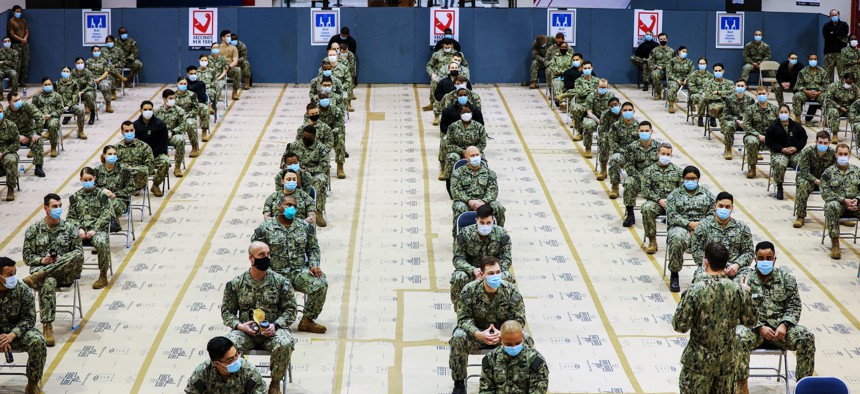
DoD
One Year into the Pandemic, Defense Department Data Remains Incomplete
Outstanding questions include: why are civilians dying at higher rates than troops?
A year since the Defense Department reported the first cases of COVID-19 within its community, researchers say the pandemic-related data released by the department has been incomplete and, in some cases, poorly explained.
“It has been a problem,” said Mark Cancian, a retired Marine Corps colonel and senior adviser with the Center for Strategic and International Studies International Security Program. “DoD has not put out a lot of information. And they don't explain the data that they get out there.”
Defense officials have been releasing data on COVID infections, deaths, and recoveries among uniformed troops, their dependents, DoD’s civilian employees, and defense contractor employees. Cancian has been tracking this data since the beginning of the pandemic, alongside CSIS research associate Adam Saxton.
“It is worth noting that they have been transparent when we contact them,” Saxton said. “But for example, when they say ‘the military,’ they don't necessarily say if it's Reserves or just active. And that changes your percentage numbers pretty significantly. That's a critical clarification that we'd like on the webpage” where DoD offers cumulative totals for various COVID data.
The lack of data aside, Cancian said DoD has held up “tremendously” against COVID-19 after a few “stutter steps” at the beginning of the pandemic.
“The infection rate has, on average, stayed a bit below U.S. society, which is a tremendous accomplishment when you consider that they're continuing to operate,” he said. ”They're onboard ships, they're deploying, they're doing training. They can't shelter in place.”
The death rate of the “defense community” — what DoD calls its troops, dependents, civilians, and contributors — is similarly below that of the general U.S. population, Cancian said. In fact, the DoD fatality rate is roughly a hundredth of what it is in society as a whole. Even after adjusting for age — as the DoD population is largely made up of service members who are younger and healthier than the general population — DoD’s fatality rate is still just one-sixth of society as a whole.
The “stutter steps,” in Cancian’s opinion, were incidents like the outbreak on board the USS Roosevelt and the temporary pause in basic training operations. But overall, DoD has managed to keep COVID-19 fatality rates low and operational tempos high.
However, DoD has thus far failed to provide answers about certain concerning trends in the limited data it has provided.
Civilians within the DoD community are dying from COVID-19 at far higher rates than the rest of the DoD population, accounting for 213 of the 319 total COVID deaths as of Friday.
In response to emailed questions, Pentagon spokesperson Lisa Lawrence said the higher rate is “probably a function of the older age of civilians” and said “we mourn the loss of any life due to COVID-19.” But they provided no official data on the increased fatality rates or whether additional prevention measures are being put in place to protect this particular population.
“It’s an interesting question,” Cancian said. He agreed that the explanation could be a result of age demographics, but also speculated that other factors could be at play. For example, civilians spend more time outside the DoD “bubble,” and the power of the Uniform Code of Military Justice can enforce prevention measures on troops in a way it cannot on civilians. DoD officials did not talk about these possibilities.
Similarly, the National Guard experienced a spike in cases at the end of January and beginning of February this year.
“We are unable to speculate as to why there appears to be a spike in COVID-19 cases among the National Guard,” said Wayne Hall, a spokesperson for the National Guard.
Saxton said this spike could be explained by any number of reasons — for example, Guard activations following the Jan. 6 Capitol riots, increased vaccination support across the country, or simply higher testing rates within the Guard population. The spikes could even be the result of simple reporting errors, he said.
“They're only releasing data three times a week. Some of these things might be corrections to previous data, accounting for corrections in the past that might lead to a dramatic spike one day that isn't really accurate. This happens with the U.S. population as well. Knowing when that's the case is helpful, [but] we don't, so it's hard to make definitive statements about things,” Saxton said.
DoD has provided no explanation of its own; Hall declined to “speculate.”
And, while DoD used to post updated numbers on how many Guard troops are deployed in a COVID-19 capacity, Cancian said they no longer provide that level of data. A Pentagon public affairs official said the information is still "available upon request."
“Those are the types of numbers we’d very much like to see,” Cancian said.
“We just don't have any explanations like ‘Okay, this is probably why X happened,’” Saxton said.
CSIS plans to release a report in the coming weeks that provides an overview of the impact COVID-19 has had on DoD operations. Despite the holes in the data, Cancian and Saxton believe it’s a “good news” story.
“The overall new trends in cases are falling,” Saxton said. “We’re still seeing some sporadic spikes on the DoD’s end, but it’s largely trending downwards.”







